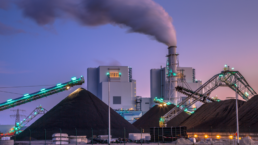According to a new report, the chances are high that your utility company is working to delay transition away from fossil fuels.
By Joseph Winters, Grist
American electric utilities often talk a good game when it comes to climate change. But many are working to keep the country hooked on fossil fuels.
A new report from the London-based think tank InfluenceMap finds that nearly half of the U.S.’s 25 largest investor-owned power utilities are working to delay the transition away from coal, oil, and gas — whether through direct lobbying at the state or federal level, public messaging, or their funding of campaigns and political parties. The report brands 11 of the 25 utilities as “laggards” and links many of them to the absence of strong climate legislation in their home states.

Kendra Haven, U.S. program director for InfluenceMap and one of the report’s authors, said that electric utilities’ actions are obstructing urgently needed progress toward the country’s climate targets. In 2019, power generation accounted for 25 percent of the U.S.’s climate pollution. Decarbonizing the sector “needs to happen to meet the U.S.’s contribution to the Paris Agreement,” Haven told Grist.
To gauge each utility’s stance on climate action and its impact on state and federal policy, Haven and her coauthors combed through hundreds of publicly available documents and recordings, ranging from social media posts to testimonials given at state hearings. Although four utilities — including Edison International and PG&E, both headquartered in California — were broadly supportive of state and federal climate policy, the majority showed either “mixed” or “negative” engagement. Their tactics included directly appealing to policymakers to keep fossil fuels as part of their states’ energy mixes and threatening legal action against cities’ proposed renewable energy standards. Many utilities have also mounted astroturf campaigns — corporate-backed efforts that create the appearance of grassroots public support — to cast fossil fuels in a positive light.
Recent Posts
“Arrest Now, Ask Questions Later”: Why Did L.A. ICE Agents Arrest and Jail U.S. Citizen Andrea Velez?
July 3, 2025
Take Action Now “They didn’t have vests that said ICE or anything. Their cars didn’t have license plates. … Just because of the color of our…
Trump’s Big, Beautiful Bill Is Naked Class War
July 3, 2025
Take Action Now Trump’s “Big, Beautiful Bill” trades tax cuts on millionaires for the dissolution of society.By Hamilton Nolan, In These Times…
Mayor Mamdani’s First Day, A Zero Hour Conversation With Richard Wolff
July 2, 2025
Take Action Now If elected, what would Mayor Mamdani do on his first day in City Hall? How would a democratic socialist govern as a big-city mayor?……
The U.S. Is Funding A Bloodbath At Gaza Aid Centers
July 2, 2025
Take Action Now The admin just gave $30M to GHF, the organization at the center of charges that Israel is weaponizing assistance and shooting at…




